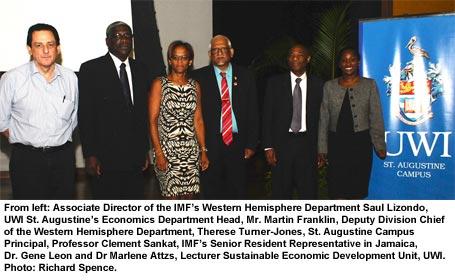 |
 |
 |
|
September 2012 |
The panel consisting Associate Director Lizondo; Deputy Division Chief of the Western Hemisphere Department, Therese Turner-Jones; the IMF’s Senior Resident Representative in Jamaica, Dr. Gene Leon and UWI St. Augustine’s Economics Department Head, Mr. Martin Franklin was eased into the discussion as they were invited to speak on the role of the IMF and regional perception of the Fund. Mr. Lizondo outlined three key functions of the Fund as surveillance, and the provision of financial and technical assistance noting that the Caribbean receives approximately 11% of the technical assistance provided by the IMF. In his contribution, Dr. Leon quickly dispelled the perception of the Fund applying ‘cookie-cutter’ policies in various regions. He explained that countries coming to the IMF when crisis has already hit are likely to receive similar treatments, he argued that this was significantly different to the approach of the IMF when the Fund is engaged outside of situations of economic crisis. Fielding the first question from the audience seemed to put the Associate Director a little on the backfoot. The panel was asked to present an example of how the new ‘touchy-feely’ IMF has taken a different approach to treating with a Caribbean country within the last five years, citing the approach applied in Trinidad and Tobago in the 1980s. Mr. Lizondo found himself conceding that his opening statement “I think some things do not change…” was not the ideal way to begin; the student audience certainly agreed. He did however go on to explain that the new IMF is developing more flexible policies and paying particular attention to protecting social spending in the countries in which the Fund intervenes.
Whether the students were satisfied with the evidence supporting the concept of a new IMF remains unclear as many of them asked, only in different ways, whether a leopard can indeed change its spots. What was obvious, however, was that the ‘new generation’ came prepared to say to the IMF that it was well informed of the Fund’s history in the region and would continue to hold it up to close scrutiny. The sizeable IMF contingent, including the panelists welcomed one-on-one engagement with attendees at the end of the session. The IMF/UWI Town Hall Meeting was held at the Daaga Auditorium, UWI St. Augustine. It followed a similar forum hosted at the UWI’s Cave Hill campus in Barbados. Campus Principal, Professor Clement Sankat brought welcome remarks and the forum was moderated by journalist, Vernon Ramesar. |


 Only a few weeks into his appointment, Associate Director of the IMF’s Western Hemisphere Department Saul Lizondo faced what must have been his most tenacious audience yet as the ‘new IMF’ engaged a young generation of critical thinkers at The UWI. On September 5, collaborating with The UWI, a panel of representatives from the International Monetary Fund (IMF) sought to give the nation’s tertiary students an unprecedented opportunity to actively contribute to the discourse on key economic issues facing the region. More importantly, the Town Hall format gave the nation’s budding economists and commentators the chance to ask the IMF all the tough questions. In summary they all amounted to one common position; an outright challenge of the notion of a ‘new’ IMF.
Only a few weeks into his appointment, Associate Director of the IMF’s Western Hemisphere Department Saul Lizondo faced what must have been his most tenacious audience yet as the ‘new IMF’ engaged a young generation of critical thinkers at The UWI. On September 5, collaborating with The UWI, a panel of representatives from the International Monetary Fund (IMF) sought to give the nation’s tertiary students an unprecedented opportunity to actively contribute to the discourse on key economic issues facing the region. More importantly, the Town Hall format gave the nation’s budding economists and commentators the chance to ask the IMF all the tough questions. In summary they all amounted to one common position; an outright challenge of the notion of a ‘new’ IMF. Dr. Leon, anticipating that the recent Jamaica intervention must have been on the minds of many attendees, provided evidence of a new IMF by referencing the Fund’s policy in a Jamaica where 140% of GDP represented the country’s debt. The policy applied in the Jamaican context included debt exchange to reduce the payments on interest and containment of Government spending among other strategies. He noted there was no devaluation of the Jamaican dollar and the Fund insisted that expenditure on social protection programmes was actually increased rather than decreased as part of overall expenditure.
Dr. Leon, anticipating that the recent Jamaica intervention must have been on the minds of many attendees, provided evidence of a new IMF by referencing the Fund’s policy in a Jamaica where 140% of GDP represented the country’s debt. The policy applied in the Jamaican context included debt exchange to reduce the payments on interest and containment of Government spending among other strategies. He noted there was no devaluation of the Jamaican dollar and the Fund insisted that expenditure on social protection programmes was actually increased rather than decreased as part of overall expenditure.